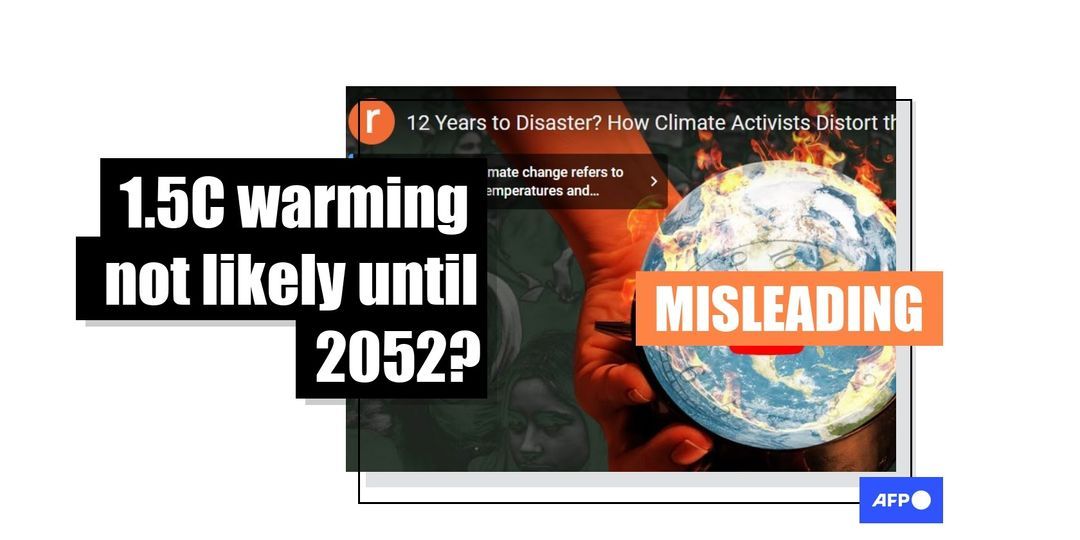
A video viewed hundreds of thousands of times disputes the view of 2030 as a critical date for measures to curb climate change, arguing that a UN report says 2052 is more important. This is misleading; the report’s authors and other experts say the video misinterprets key data which indicate global warming will likely reach 1.5 degrees Celsius in the early 2030s.
The video criticizes activists, politicians and the media for treating 2030 as a “cliff edge” for climate catastrophe — and for suggesting there are “12 years left to save the world,” a claim that traces back to when the UN report was released in 2018.
Reason, a US libertarian magazine, published the clip in April 2021, but it resurfaced in a Facebook post on January 7, 2023. It has been promoted repeatedly across social media, receiving thousands of shares and views on Facebook and YouTube.
“The data behind apocalypse 2030 is based on placing blame, not predicting the future,” the recent Facebook post says.
 Screenshot of a April 4, 2022 YouTube video showing pages from an IPCC climate report
Screenshot of a April 4, 2022 YouTube video showing pages from an IPCC climate reportThe video claims the UN’s data indicate 2052 is a more important timeframe for curbing climate change than 2030.
However, several experts told AFP the document’s evidence pointed to 2030 as a key target date to limit global warming to 1.5C and avoid the worst effects of climate change. Another UN report from 2021 — released after the video was first published — reinforced this view.
Scientists working with the group that published the documents, the Intergovernmental Panel on Climate Change (IPCC), told AFP the target has been misunderstood in the past. But the video is “not an accurate summary of the report’s findings,” said Joeri Rogelj, a co-author and professor of climate science at Imperial College London.
“If we have not managed to reduce global CO2 emissions markedly by 2030, human CO2 emissions will have pretty much committed the planet to warming beyond 1.5C,” Rogelj said.
2030s crossover ‘likely’
The 2018 UN Special Report says: “Global warming is likely to reach 1.5C between 2030 and 2052 if it continues to increase at the current rate.” The document includes a graph that indicates warming would cross that threshold around 2040.
But in Reason’s video, mathematician Aaron Brown honed in on the upper end of the range.
“If you think the problem with global warming is higher temperatures, melting ice caps, rising sea levels, then you care about the date the report projects actual temperatures reach 1.5 degrees, which is 2052, if things continue at the current rate,” Brown said.
The report’s authors contest this interpretation.
“The video is inaccurate in terms of saying the most likely crossing date for 1.5C is 2052,” said Piers Forster, professor of climate physics at Leeds University. “The report said that 1.5 would be crossed between 2030 and 2052, so around 2040.”
Forster noted the 2021 document “revised this estimate and brought this forward to the early 2030s.”
“So crossing 1.5C around 2030 is very likely,” he said.
The August 2021 publication used updated data to give a more detailed picture. It concluded that in all but one of the IPCC’s working scenarios for projected climate change, “the central estimate of crossing the 1.5C threshold lies in the early 2030s.”
Amanda Maycock, co-author of the 2021 report and director of the Institute for Atmospheric and Climate Science (ICAS) at Leeds University, told AFP that it is “less likely the time at which 1.5C is reached will be as late as 2052 and more likely it will be in the 2030s.” She added that “impacts would be considerably lower” if warming is limited to 2C.
“Any action taken now will avoid additional future impacts,” Maycock said.
‘We have to act now’
Reason’s video says the 2018 IPCC report’s reference to 2030 “was the worst-case scenario not in terms of actual global warming, but in terms of warming caused only by humans, independent of what’s actually happening in the environment.”
But Forster of Leeds University said that claim is “wrong.”
“The 2030 date comes really from the date by which we have to halve CO2 emissions if we want to have a chance of limiting warming to 1.5C,” he said. “So we don’t have 12 years left to do this — in fact, we have to act now.”
Kimberly Nicholas, a climate and sustainability scientist at Lund University in Sweden, agreed, saying: “We have these next seven years to replace most fossil with clean energy in order to avoid catastrophic climate change.”
The video focuses on a graph in the 2018 IPCC report that shows rising global temperatures and projects when they might reach 1.5C. The line spans a range of estimates for the extent of human-caused warming.
 Screenshot taken January 17, 2023 of a graph from the IPCC’s 2018 Special Report
Screenshot taken January 17, 2023 of a graph from the IPCC’s 2018 Special Report“This is not a measure of actual warming,” a voiceover says. “This chart is actually showing estimates of anthropogenic warming.”
Experts say the distinction is not meaningful.
Climate skeptics often claim global warming is due to natural factors. But scientists and the IPCC say all the heating measured since the mid-19th century has been “anthropogenic,” or human-driven.
“All of the recent observed warming, which is about 1C … is due to human drivers,” said Malte Stuecker, a co-author of the 2021 IPCC report, in an email.
Maycock of ICAS said the graph indicates the 1.5C crossing point is more likely to occur early in the 2030-2052 range. Rogelj of Imperial College London also said Reason’s video “misinterprets the graph.”
“2030 is a line in the sand for emissions reductions in line with keeping warming to 1.5C,” he said.
Read all of AFP’s climate-related fact checks here.
